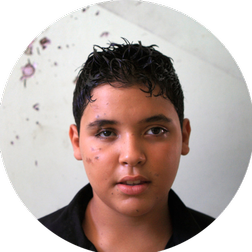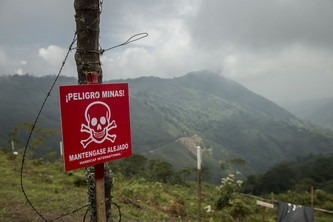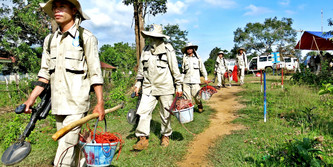Abstimmung über UN-Resolution zu Streubomben
Ende Oktober 2017 stimmten die Länder - wie bereits in 2015 und 2016 - im Rahmen des "First Committee meeting of the 72th UNGA session" über eine UN-Resolution zu Streubomben ab. Auch in diesem Jahr zeigte sich, dass eine überwältigende Mehrheit gegen den Einsatz von Streubomben ist. Auch viele Länder, die nicht teil des internationalen Verbots, des Oslo-Vertrags, sind, stimmten für die Resolution. Nur Russland und Simbabwe stimmte dagegen (auf Englisch).
Quelle: CMC
In October 2017, at the end of the First Committee meeting of the 72th UNGA session, states voted on the annual UN resolution on the implementation of the Convention on Cluster Munitions.
Resolution L.41 was adopted by the First Committee with a vote of 134 in favor, two against, and 36 abstentions. The slight decrease in favorable votes compared with the 2016 UN General Assembly result can be explained by the absence of a number of delegations at the time of voting. The two votes against, from the Russian Federation and Zimbabwe, are similar to last year’s.
The 36 abstentions mark a modest improvement on last year’s 39 abstentions: both Nepal and Yemen voted in favor of resolution L.41 after abstaining at the UNGA in 2016. South Sudan, which abstained in 2016, did not vote on L.41 this year. No state changed from voting in favor to abstaining.
Oddly, two states that have actually signed the Convention (but still have to ratify it) have consistently abstained on the resolution since it was first introduced in 2015 – Cyprus and Uganda.
No less than 30 states not yet on board the Convention voted in favor of resolution L.41, thus demonstrating that they embrace the humanitarian aims of the Convention. This included Equatorial Guinea, which supported the resolution after being absent last year. Other supporters were recurrent ones and included four states that have used cluster munitions in the past: Ethiopia, Eritrea, Libya and Thailand.
Singapore, which voted in favor, provided an explanation that mentioned its indefinite moratorium on exports of cluster munitions.
Twelve states that abstained explained their votes. Argentina said that while it supported the aim of eliminating cluster munitions, it disagreed with the lack of ambition reflected in the Convention’s Article 21, a view that Brazil also shared. Cyprus said its favorable vote was held back by its security situation. Iran did not want to lend its support to an instrument concluded outside the UN disarmament machinery. The Republic of Korea expressed sympathy for the aims of the Convention and noted that only cluster munition with self-deactivation mechanisms could be included in its acquisition plans. Myanmar referred to a lack of implementation capacity when explaining its abstention. Estonia, Finland, Greece, Pakistan, Poland and Romania said the Convention on Conventional Weapons (CCW) was the appropriate forum to discuss cluster munitions.
The Cluster Munition Coalition notes that states that believe Article 21 contravenes the spirit of the Convention should join in the instrument and defend their interpretation of the text as full states parties, thus reinforcing a strong norm against the use of cluster munitions under any circumstances. It also notes that there have been no deliberations on cluster munitions at the CCW since 2011, when the rejection of a draft protocol on these weapons left the Convention on Cluster Munitions as the sole international instrument dedicated to ending the suffering they cause.
As usual, the resolution will be put to a vote at the UN General Assembly in December 2017.
Lesen Sie hier den Originalartikel
Neuigkeiten

Nein zu Streubomben!
Spenden Sie jetzt für unseren Einsatz gegen Streubomben! Verhindern Sie, dass noch mehr Kinder wie Mohamed schwer verletzt oder gar getötet werden. Retten Sie Leben und verhindern Sie bleibende Behinderungen.





